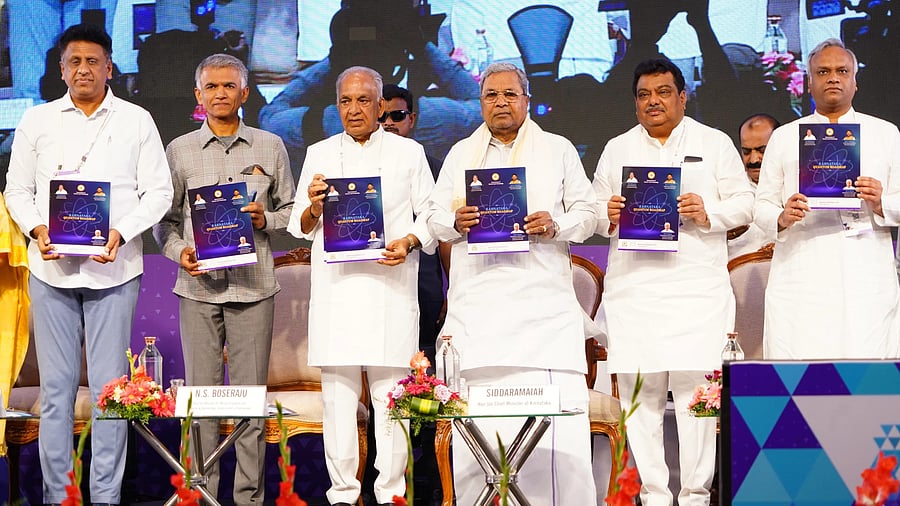
Ministers MC Sudhakar, Krishna Byre Gowda, NS Boseraju, CM Siddaramaiah, MB Patil and Priyank Kharge at the launch of Karnataka’s Quantum Roadmap, during Quantum India Bengaluru Summit on Thursday.
Credit: CMO
Bengaluru: Day two of the Quantum India Bengaluru Summit saw a continuation of conversations revolving around quantum technology and its application in various sectors.
Following a keynote lecture by 2004 Nobel Laureate David Gross, a panel discussion on the topic ‘Creating a coherent ecosystem of startups for quantum technologies in India’ was organised.
Among the interesting sessions on the second day of the event was a talk by IIT Bombay professor Kasturi Saha. Titled ‘Biomolecular sensing with quantum sensors’, it shed light on the use of quantum technology to better understand brain cancer treatment.
This was followed by a panel discussion on ‘Harnessing Quantum Technologies to address today’s Healthcare challenges’. It was moderated by Shesha Raghunathan of IBM, and the panellists included Vijay Chandru of Strand Life Sciences, Deepak Kumar Saini of IISc, Songi Han of Northwestern University (USA), Sohail Bhagat of pi Ventures, and Pranab Dutta of GDQ labs.
The discussion focused on where quantum technology currently stands with regard to healthcare. “After the eras of reactive and curative healthcare, we’re currently in healthcare 3.0, the era of preventive medicine. The convergence of technology has enabled healthcare to become predictive, preventative, personalised and participative,” said professor Saini. Professor Han delved into how quantum technologies can be leveraged to better understand and find solutions for hindrances revolving around circadian biology and vitamin d deficiency.
A few sessions on the more complicated aspects of the technology in relation to laser technology and indigenous and indigenous dry dilution refrigerators were explained.
The final session was held by Professor Tommaso Calarco, European Union Quantum Flagship and Institute of Quantum Control PGI-8, Germany, to explain about building quantum technology according to European strategy.
“Quantum technology is a part of life in all aspects and we are prepared to support India in its quantum journey,” said Prof Calarco.
The two-day Summit saw over 70 speakers across 25 sessions, over 29 exhibitors, 40 poster presentations, and about 1,000 delegates and 2,000 attendees from 19 countries.
Karnataka will hold a Quantum Summit every year: Boseraju
A Quantum India Bengaluru Summit will be held every year, announced N S Boseraju, Minister of Minor Irrigation and Science and Technology on Friday on the final and second day of the First Edition of the Summit.
The government of Karnataka in respect to the Quantum Summit will conduct roadshows across India and other major countries to attract investments, added Boseraju.
M C Sudhakar, Minister of Higher Education, “Vishveshwaraiah University will have Quantum Technology from the upcoming academic year and we will give instructions to Public Universities to look at how we can bring in Quantum and related subjects into pure science.”
The QOSMIC satellite systems private limited, a startup based on optical and quantum communication, from Bengaluru won the award for the most emerging quantum startup.
131 people participated in the poster presentation out of which 41 people were selected. Four people, out of which two were from Indian Institute of Science Bengaluru (IISC), were awarded for best poster presentation with a cash prize of Rs 20000. The two-day summit saw over 2000 attendees from over 19 countries.